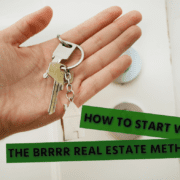Hard Money Vs Banks: Which Lending Option is BEST?
Hard Money Vs Banks: Which Lending Option is BEST?
Investors are always wondering which lending option is best for their needs and when is it better to use hard money instead of banks? Let’s start by identifying what is hard money. Hard money is asset based lending that real estate investors can use when their credit scores are not up to par with bank requirements. Unlike banks, hard money lenders aren’t looking at the credit scores. Instead, they are looking at the project and the property. Today banks are getting tighter and credit score requirements are increasing. As a result there is a decrease in funding. Have no fear! It is still possible to get 100% financing with a credit score below 700. Let’s compare hard money vs banks to determine which option is best for you.
Who uses hard money?
Hard money is for everyone! From the new investor, to those who have 20 years of experience, everyone can benefit from using hard money. Hard money creates flexibility that many banks can not provide. Whether it’s a small deal in a small community, seconds, thirds, or even land, hard money can help you complete any translation that is asset based. As long as the property is good, with a good exit strategy, then you can negotiate to get hard money lending
What can we do for you at Hard Money Mike?
Here at Hard Money Mike we are able to provide 100% financing on BRRRR and 100% financing on fix and flips, as long as the ARV is good. For clarification, ARV stands for the after repair value. A hard money lender looks at the value of the property and what it can become based on the ARV. That’s another big difference between hard money and banks. It doesn’t matter when you go to a bank, or what kind of a deal you are getting. Banks will only focus on the LTV or loan to value amount.
Let’s look at an example of hard money vs banks:
| Property purchase $300K
ARV 600K |
||
| Hard Money | As a hard money lender, I would feel comfortable lending up to 100% on the deal because it’s a great deal. | |
| Hard money is better than banks when you are basing it on ARV | ||
| Banks | If you go to a bank, they will compare the ARV and the purchase price and determine which is lower. In this example, the banks would base their decision on the 300K purchase price. | |
| From that base amount of 300K, the bank will then require you to put in 20% to 25%. | ||
When you are deciding between hard money and banks, always remember that hard money is best when you have good deals based on the ARV, and when you don’t want to put a lot of money in. This is also true for BRRRR, if you want to find that undervalued property and use a hard money lender to fund 100% of the rehab. Once again, if it’s a good deal based on the ARV in this market at 70% to 75%, and you can refinance it, then hard money has the flexibility that you need.
Credit score requirements and limitations.
Most hard money lenders do not look at your credit score to make their decision. Instead, they might look at your score to make sure that you are paying, not in bankruptcy, and not in foreclosure. However, hard money lenders will not be concerned by high usage or low scores. These values are not a big deal for hard money lenders. Most importantly, hard money lenders will not kick you out the door because you have a 679 credit score instead of a 680.
You don’t need to fit into a box.
While banks often have slightly lower rates and longer term options than hard money lenders, banks want you to fit into their box in order to lend. Whether that is meeting their credit score requirements, income requirements, or their coverage ratios, banks do not have the same flexibility as hard money lenders. Flexibility and uniqueness is where you go for your hard money lending. Especially if the property is based on ARV and the value is there.
3 instances where you should use hard money over banks
- If you want to base your lending off of ARV and have a good deal.
- If you have a credit score that does not hit into the 700s.
- If your income just started or you aren’t 2 years out.
- If you just write everything off.
What do you need to look for in a hard money lender?
It is imperative that you get a hard money lender who is flexible enough to do your deals when you have a good deal. What is a good deal? A good deal is dependent on whether or not the market is good in the area, if you have a good exit strategy, and a great LTV. Another important factor to consider is if you have a bridge or a lender set up on the other side. Hard money lenders are not looking for deals that are 100% financing with 100% LTV.
Where do you find hard money lenders?
1. A local person or company:
This is a local person or company who is lending true hard money. Make sure that they are well established and have a web presence before diving in. Wall Street has taken over the big loans and only accepts investors who can fit into their box. Hard money on the other hand has no box! It provides the flexibility to fit any investor no matter what the deal.
2. Real estate groups:
Connect with the investors in your real estate group. They all know some hard money people who they have worked with in the past. This is especially true if they’ve been in this business for more than three years. By connecting with people in the community, you will find hard money lenders who are reliable.
3. Real estate forums:
Real estate forums are an excellent place to go and ask questions to find out who the hard money lenders are in your area. There is always a need for hard money in real estate investing.
What do you look for and what questions should you ask?
First and foremost don’t get involved with a hard money lender who has a lot of up front fees. Some may ask for $1,000 to $5,000 down. Don’t go down that path, because they are just collecting fees, not helping investors. Instead, look for people who have experience within your real estate groups and forums. Do your own research to make sure they are funding deals and have some flexibility with their lending. Whether it is a cross lien, second, or even commercial property. It is also important to ask what they will and won’t lend on. Finally, it is important to start working with them and building that bridge. This will help you in the future if you have another deal that needs hard money lending.
Watch our most recent video to find out more about Hard Money vs Banks to discover which lending option is right for you.
We are here to help you with your hard money needs here at Hard Money Mike. Contact us today to find out more.












Leave a Reply
Want to join the discussion?Feel free to contribute!